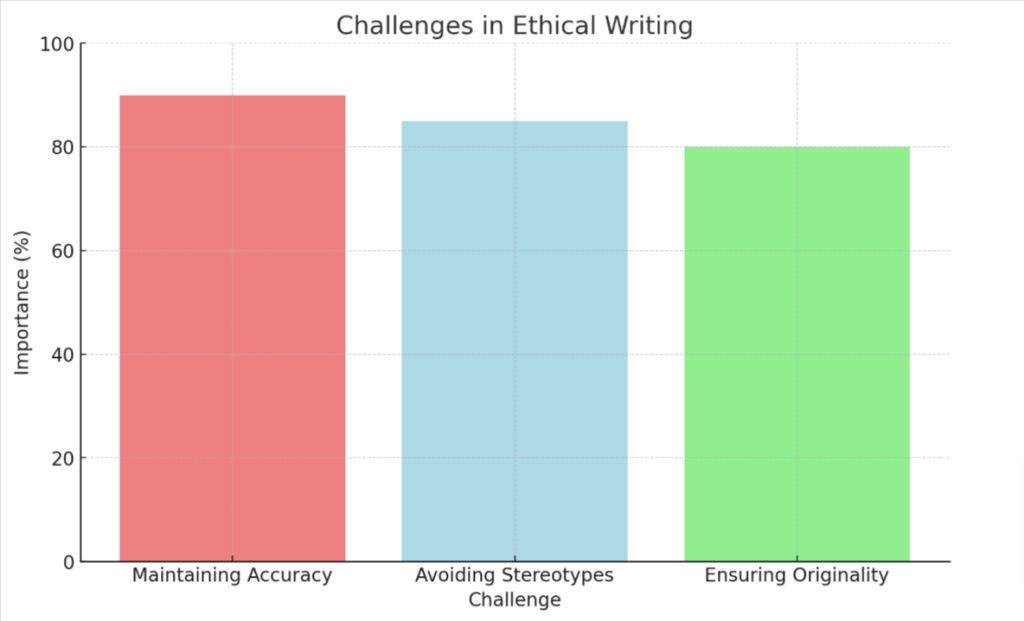Ethical Considerations in Sensitive Niche Writing
When you’re a writer, tackling sensitive topics can often feel like navigating a minefield. Did you know that nearly 64% of freelance writers have reported feeling uncomfortable or nervous about writing on certain subjects? In this blog post, we aim to provide guidance and practical advice on how to address delicate matters ethically and responsibly in your content creation process.
Ready to explore the exciting world of ethical niche writing? Let’s dive in!
Key Takeaways
- Identify fragile topics to handle them with care in your writing.
- Avoid token characters that perpetuate stereotypes and harm representation.
- Utilize sensitivity readers for expert insights on cultural elements and accurate portrayals in your content.
Understanding Sensitive Topics for Writing
Identify fragile topics and avoid token characters, while utilizing sensitivity readers for ethical writing in sensitive niches.
Identifying fragile topics
Sensitive subjects demand careful navigation to avoid causing unintentional harm or offense. Recognizing topics that can be fragile is the first critical step in handling them with care in your writing.
These could range from issues of race, gender, and religion, to mental health concerns, trauma, or violence. Social media platforms often act as a mirror for society’s sensitivities; they provide valuable insight into what topics are considered delicate at any given time.
Monitoring ongoing conversations on these platforms helps anticipate potential pitfalls while covering sensitive matters in your articles or blogs.
Avoiding token characters
Carefully consider every character in your story to avoid tokenism. Token characters can unwittingly perpetuate stereotypes and harm the representation of diverse groups in writing.
Writers should ensure that each character has depth, a unique personality, and contributes meaningfully to the narrative.
Token characters don’t support socially sensitive storytelling; they obstruct it. Readers catch on quickly when a character is superficial or included merely for diversity’s sake. It isn’t enough to randomly insert marginalized characters into your work; their experiences and perspectives must be authentic and well-researched for ethical writing about sensitive subjects.
Utilizing sensitivity readers
Sensitivity readers play a pivotal role in ethical writing, especially when dealing with delicate and nuanced topics. These individuals are experts at understanding cultural elements, spotting stereotypes or harmful representations in your content.
They push for accuracy and respect towards all subjects, enhancing the credibility of your work. Their unique insights can help you strike the right balance and tone, ensuring that your piece does not alienate any section of your audience.
Thus, sensitivity readers open avenues to approach sensitive topics responsibly while maintaining an empathetic tone throughout your text.

Personal Experience: Writing 5 Articles a Week
I write five articles a week, and it can sometimes be overwhelming. However, I have found that having a writing schedule helps me stay organized and reduces stress.
Tips for stress-free writing
- Create a comfortable workspace free from distractions.
- Set specific goals and deadlines to stay motivated.
- Break your writing tasks into smaller, manageable chunks.
- Use helpful tools like grammar checkers and productivity apps.
- Take regular breaks to rest and recharge your mind.
- Practice self – care activities such as exercise or meditation to reduce stress.
- Seek feedback from trusted sources to improve your writing skills.
- Stay organized with outlines or mind maps to structure your ideas.
- Embrace the editing process and don’t be afraid to make revisions.
- Celebrate small achievements along the way to stay inspired.
Remember, writing can be a fulfilling and enjoyable endeavor when approached with the right mindset and strategies in place!
Benefits of a writing schedule
A writing schedule offers several benefits, making the writing process more efficient and productive.
- Increases productivity
- Improves time management skills
- Reduces procrastination
- Creates a routine for writing
- Helps maintain focus and concentration
- Enhances creativity and inspiration
- Develops discipline as a writer
Enhancing Your Writing with Clustering
Use creativity as a tool for inspiration, connecting ideas to your story and enhancing the flow of your writing.
Using creativity for inspiration
Using creativity for inspiration is a valuable skill in enhancing your writing. By tapping into your imagination, you can bring fresh and unique ideas to your work. Whether it’s brainstorming new storylines or finding innovative angles for your content, creativity helps to captivate readers and hold their attention.
Connect seemingly unrelated ideas, explore different perspectives, and think outside the box to infuse your writing with originality. Embrace your creative side and let it inspire you as you craft engaging and thought-provoking pieces that resonate with your audience.
Connecting ideas to your story
Connecting ideas to your story is a crucial aspect of enhancing your writing. By utilizing creativity and clustering techniques, you can find inspiration for your content and make meaningful connections between different ideas.
This allows you to create a cohesive narrative that engages your readers and keeps them hooked from beginning to end. Whether you are writing fiction or non-fiction, the ability to connect ideas in a logical and engaging way is essential for creating compelling stories that resonate with your audience.
So, don’t be afraid to think outside the box and explore new ways of connecting concepts in your writing.
Ensuring Ethical Standards in Writing
Maintain accuracy and originality by utilizing tools and conducting thorough research, while also handling rejection and conflicting beliefs with grace and professionalism.
Tools for maintaining accuracy and originality
Maintaining accuracy and originality in writing is crucial when tackling sensitive topics. To ensure your work is credible, consider utilizing the following tools:
- Fact-checking websites: Use reputable fact-checking websites to verify information before including it in your writing.
- Plagiarism checkers: Run your content through plagiarism checkers to ensure that your work is original and free from any copied material.
- Reliable sources: Rely on trustworthy sources such as peer-reviewed articles, academic journals, and experts in the field to provide accurate and reliable information.
- Online research databases: Utilize online research databases to access scholarly articles and studies that can support and enhance the credibility of your writing.
- Style guides: Follow established style guides like APA or MLA to maintain consistency and professionalism in your writing.
- Proper citation: Always give credit where it’s due by properly citing your sources using the appropriate citation style.
Strategies for handling rejection and conflicting beliefs
Freelance writers face challenges when it comes to handling rejection and conflicting beliefs in their writing. Here are some strategies to navigate these situations:
- Embrace constructive criticism: Instead of seeing rejection as a setback, view it as an opportunity for growth. Learn from feedback and use it to improve your writing.
- Maintain an open mind: Be willing to consider different perspectives, even if they contradict your own beliefs. This can help you create well-rounded and balanced content.
- Seek diverse opinions: Engage with people who have different viewpoints and experiences. This can broaden your understanding of complex issues and enhance the credibility of your writing.
- Stay true to your values: While being open-minded is important, don’t compromise your ethical principles or personal boundaries. Write in a way that aligns with your core values.
- Find common ground: Look for areas where differing opinions intersect and find ways to bridge the gaps between them. This can foster understanding and create opportunities for meaningful dialogue.
- Educate yourself: Conduct thorough research on controversial topics to ensure that you have a comprehensive understanding before tackling them in your writing. This will help maintain accuracy and avoid misrepresentations.
Finding your niche and specialization
Freelance writers face the challenge of finding their niche and specialization in order to stand out in a crowded market. It’s important to identify an area of expertise that aligns with your interests and skills.
This could be anything from science writing to digital content creation. By focusing on a specific microniche, you can establish yourself as an authority in that particular field. Finding your niche allows you to develop a unique voice and style, which will attract clients who are specifically interested in that subject matter.
Conclusion
In conclusion, writing in sensitive niches requires a deep understanding of ethical standards and responsibilities. Freelance writers must find a balance between creativity and responsibility to ensure their stories have ethical integrity.
By approaching sensitive topics with empathy and adhering to high ethical standards, writers can create content that is both engaging and socially responsible.

